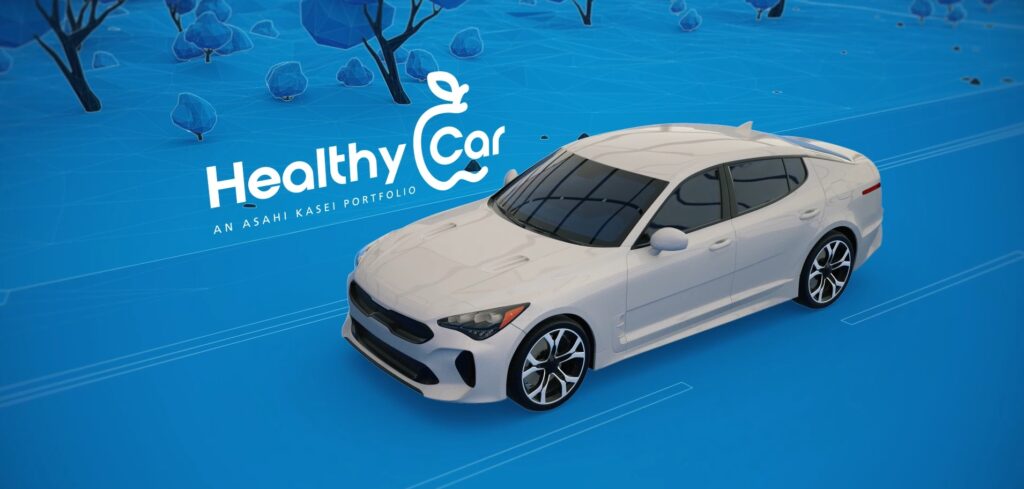According to Japan-based Asahi Kasei, the Covid-19 pandemic has changed car users’ perceptions of safety and comfort inside automotive vehicles. As a result, global car users’ willingness to invest in solutions to deal with pathogens on interior surfaces and in the in-cabin air is growing.
This development is one of the key findings of the second Asahi Kasei Automotive Interior Survey conducted in December 2020. The survey suggests that the pandemic will have a lasting effect on existing and future mobility concepts, as well as on the materials and technologies used inside vehicles.
As the main interface between the user and the car, surface materials are defining how the driver and passengers perceive the automotive interior and, more importantly, the driving experience itself. In the past, automotive interiors needed to be comfortable, attractive and smooth to the touch. Now there is a new dimension: a desire for overall cleanliness and safety against invisible threats inside the car.
For US-based respondents to the survey, 56% of car users emphasize this issue, valuing it even higher than connectivity, intuitive operation and personalization of the car. The same results can be observed in other markets as well. For example, four out of five car users in China find cleanliness inside the car important (Figure 1).
| Figure 1: Increasing importance of cleanliness inside the car | ||||
| USA | Germany | Japan | China | |
| I put great emphasis on the cleanliness of my car | 56% | 64% | 58% | 82% |
| All features for operating the car have to be intuitive | 45% | 54% | 31% | 79% |
| All settings in my car are personalized to suit my personal needs | 50% | 54% | 26% | 59% |
| I like connectivity features in my car | 52% | 45% | 19% | 74% |
| Good-looking premium surfaces are important to me | 50% | 40% | 23% | 69% |
When asked about features they would consider beneficial in their next car, 80% of respondents in the USA cited ‘surface and seating materials that are easy to wash’, followed by ‘water- and dirt-repellent surfaces’, (72%) and ‘advanced air filtration system filtering the outside air entering the vehicle’ (68%) (Figure 2).
In addition, 87% of car users in China see a benefit in an ‘advanced air filtration system filtering air within the vehicle’, and 83% in ‘surfaces that can eliminate viruses in places you touch the most’.
| Figure 2: Global car users’ requirements for hygienic interior features | ||||
| USA | Germany | Japan | China | |
| Surface and seating materials that are easy to wash | 80% | 75% | 54% | 87% |
| Advanced air filtration system filtering the outside air entering the vehicle | 68% | 69% | 63% | 85% |
| Advanced air filtration system filtering the air within the vehicle | 68% | 64% | 60% | 87% |
| Water- and dirt-repellent surfaces | 72% | 66% | 65% | 82% |
| Surfaces with materials that can eliminate viruses and bacteria in places you touch the most | 55% | 52% | 62% | 83% |
| Automated disinfection of surfaces within the vehicle | 55% | 37% | 61% | 74% |
Iichiro Kitsuda, EVP of strategic planning and marketing at Asahi Kasei America, commented, “This survey sheds light on the lasting importance of clean automotive interiors as we transition to a post-Covid era. Automotive manufacturers will need to adapt to the users’ concerns and adjust to the high demand for clean automotive interiors not only in private cars but in all future mobility concepts.”
Car users’ increasing desire for hygienic features is also reflected in their readiness to pay for solutions that provide safe surfaces and air inside the car. For example, nearly 90% of US respondents who are looking to purchase a large or luxury vehicle would be willing to spend US$750 for additional surface protection treatments, and nearly 80% of truck and SUV buyers would be willing to spend the same amount.
A similar trend can be seen regarding features that contribute to air safety. When purchasing a new car, nearly 90% of US respondents looking to purchase a large or luxury vehicle, and over 80% of truck and SUV buyers, would be willing to spend US$750 on features designed to purify cabin air.
Kitsuda continued, “The data in this study confirms that consumers are ready and willing to pay more for advanced technologies when they shop for cars – as long as they boast heightened safety from threats we can and cannot see. This is where Asahi Kasei’s Healthy Car portfolio shines through: we are proactively developing products that can be used to keep private and shared vehicles cleaner and safer. The survey shows that this is exactly what consumers from around the world expect from the vehicles they occupy. We’re looking forward to teaming up with the forward thinkers in the automotive industry to help contribute to a safer, more comfortable automotive experience of tomorrow.”
Data for the survey was collected via an online survey panel between December 8 and 15, 2020. For the 500 respondents in the USA, the average age was 44 years, with 72% living in urban areas. Over 50% of the respondents had an income level between US$35,000 and US$100,000 per year.



